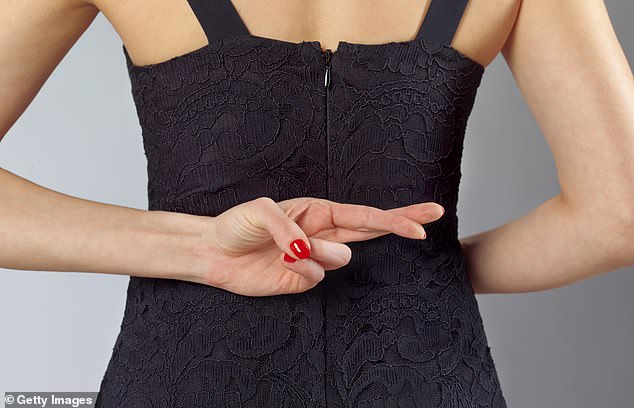I’m a former FBI spy agent and body language expert – how people abroad can tell you’re American
Americans are known for their patriotism and pride in their great country.
But there is one scenario in which some American citizens might not be so quick to admit where they’re from: when they’re traveling abroad and don’t want to stand out.
According to behavioral experts, we are the nationality that is easiest to recognize, even before you open your mouth.
Over the years, intelligence agencies have sought to uncover what it was that made Americans seem so American, helping undercover agents hide behind enemy lines.
And a – Joe Navarro, a former FBI spy catcher and body language expert — has revealed to DailyMail.com exactly what researchers have discovered about these traits.
Americans generally dress less formally than people from other cultures, Navarro said.
By From the way you dress to the way we hold flowers, he told us what to change if you want to fit in.
Mr. Navarro has made a career out of interpreting and understanding people’s body language, a skill he says he developed when he moved to the United States from Cuba with his family as a child.
“I am here as a spectator. I am investigating the human zoo,” he said, explaining his profession.
He noted that the US is an incredibly diverse country and that cultural differences within the country make it difficult to draw conclusions about Americans as a whole.
However, during his work abroad and during his personal experiences identifying spies, he found that certain themes kept recurring.
There is nothing wrong with looking American, Mr. Navarro said. But he believes the best way to travel is to immerse yourself in the culture you are in, he said.
This way you stay safe and have the most authentic experience you can have abroad.
Hand gestures and signals

Certain hand gestures that are harmless in the United States can be shocking in other cultures. Crossing your fingers is explicit in Vietnam
According to Mr Navarro, something as simple as the way someone carries a bouquet of flowers can provide clues to that person’s origins.
While monitoring someone suspected of spying on the United States, Mr. Navarro and his team saw their target leave a store with a bouquet of flowers. The man left the flowers hanging next to him and pointed down — a clear sign that he was not the American he was pretending to be.
Americans, he said, usually carry the flowers upright, like a bridesmaid at a wedding. People from Eastern Europe usually carry the flowers downward, so that the water flows to the petals.
When the spy was later confronted with this information, he confessed it to Mr. Navarro.
Other hand and body movements can also give you away.
Imagine wishing someone luck on a trip to Vietnam and letting them know you’re rooting for them, you might be in for a rude awakening.
In the country, that hand gesture would resemble the female genitals, and it looks a bit like the middle finger in Western countries.
Social media users have brought the idea of an “American attitude” to the attention of the general public, describing an attitude of Americans that they believe sets them apart from Europeans.
Users like this TikToker rachaelsulliexplained that when standing still, Americans tend to shift their weight from one leg to the other or find a wall, railing, or countertop to lean against.
She said that in Italy, where she lives, people usually stand upright when they wait.
Sneakers, caps and shorts

People in different countries wear sportswear, but reserve it mainly for the gym, Mr Navarro said
Americans generally dress much more casually than people from other cultures, Navarro said.
On many of his travels — to Milan, Budapest, and even the Russian countryside — people tend to dress much more formally than Americans, with an eye for fashion.
For example, he said that American men often take shorts with them on their summer vacations, which clearly gives away their nationality.
Baseball caps, athleisure, large reusable water bottles and old, dirty tennis shoes are other common American accessories that in European countries you usually only see at the gym.
The style of makeup also makes a difference. In many European countries, wearing false eyelashes, acrylic nails and contouring would look out of place, he said, and can alert people to your American nationality.
The loudness of your voice – and whistle

Foreigners sometimes think Americans are loud. If you act as a cultural mirror, you might be able to blend in better, he said.
Mr. Navarro has given many workshops abroad and has said that in almost every country he has ever been to, someone asks him the question, “Why do Americans talk so loud?”
While he doesn’t think this is true for every American, Mr. Navarro said many foreigners see Americans as loud and brash. This could have something to do with American culture, which lacks the emphasis on community that other cultures have.
If a child in America walks whistling through the aisles of a supermarket, chances are no one will say anything, he said.
In a country like Japan, on the other hand, he said, strangers will point out something rude to you and ask you to stop.
“There are societies where culture and the group are more important than the person. Think of America, for example,” he says.
‘People learn to see themselves as separate individuals.’
A good rule of thumb is to become a reflection of your environment, Mr. Navarro said.
“You have to belong to the agency. So whatever culture you’re in, you reflect that culture,” he said.
In many Latin American countries, for example, people are more affectionate than Americans are used to, greeting each other with a kiss on the cheek and touching each other’s arms and shoulders when they talk, he explained.
If you travel there, it might be wise to adopt some of those habits.
In the Scandinavian countries, on the other hand, people hardly touch each other, which is why Mr Navarro said he is careful to keep enough distance from his colleagues.
The same goes for speaking volume. If you are an American abroad and you are aware of the volume of the people around you, you are less likely to stand out.
This may sound strange or inauthentic, but according to Mr. Navarro it is important to be culturally reflective because “the trick is to fit in and not to be rejected, ignored, ridiculed or seen as awkward.”
